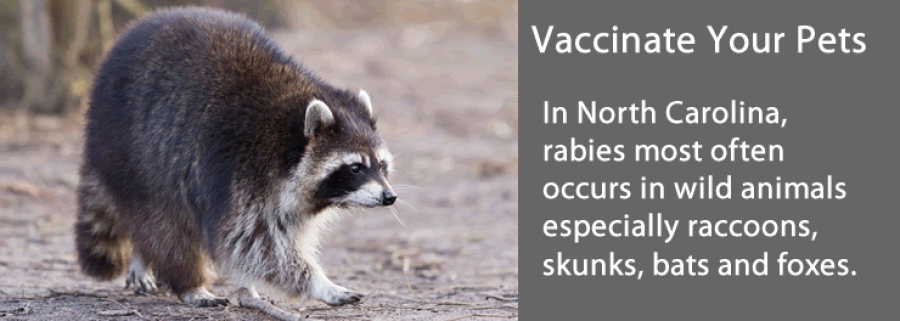The health system said in a statement the raccoon tested positive for rabies this month.
“Rabies is a vaccine-preventable viral disease that is fatal if the disease occurs in humans and warm blooded animals,” the health system said. “Exposure to rabies may occur from bites, scratches and contamination of mucous membranes (such as eyes) with saliva from a rabid animal.“
Rabies is endemic in the local wildlife population and the primary carriers include skunks, raccoons, fox, bobcats, coyotes, feral cats and bats.
(A low cost rabies vaccination clinic — $5 per animal — is currently planned for October 22 and will be located at the Halifax County Farmers Market on Highway 158 outside Roanoke Rapids. For hunt clubs or other individuals with at least 10 animals needing rabies vaccination, contact Animal Control to schedule rabies vaccination at your location for the same reduced fee. Further information is available at this link or by calling the health system at 252-583-6651)
The health system encourages the public to use the following precautions to protect their families and pets:
Always keep your pets up-to-date on rabies vaccination.
Supervise pets outdoors, and keep all pets on a leash
Never approach wildlife, especially during the daytime
Never approach wildlife exhibiting odd behavior.
Do not feed pets outdoors. Pet food attracts wildlife. Do not feed wildlife, feral cats or feral dogs
In the event a family member is bitten or scratched by any animal that could possibly have rabies the health system recommends the following:
Clean the wound well with soap and flush with running water for 15 minutes and contact your doctor.
The doctor will determine if a series of rabies vaccinations will be needed.
Note the location and a description of the animal to provide to animal control.
Do not try to catch any wild animal that bites or scratches you. Call your local animal control office immediately to capture the animal for rabies testing.
If the animal is someone’s pet, get the owner’s name and address and provide them to the animal control officer.
Any mammal can transmit rabies. The animal that bit you, depending on the species and circumstances, must be evaluated or tested for rabies.
“Having your pet properly vaccinated is critical because a properly vaccinated pet that is exposed to a rabid or potentially rabid animal is only required to have a booster rabies vaccination within five days of exposure whereas an unvaccinated pet that is exposed to a rabid or potentially rabid animal must either be euthanized or quarantined for six months at a facility approved by the health director at the owner’s expense,” the health system said, according to North Carolina General Statute 130A-197. “ Make sure that you keep your pet safe from rabies by maintaining proper rabies vaccination status.”








